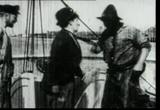This article needs additional citations for verification .(June 2019) |
| Shanghaied | |
|---|---|
 Swedish theatrical poster | |
| Directed by | Charlie Chaplin |
| Written by | Charlie Chaplin |
| Produced by | Jess Robbins |
| Starring | Charlie Chaplin Edna Purviance Wesley Ruggles Bud Jamison Billy Armstrong Paddy McGuire Leo White John Rand Fred Goodwins Lee Hill |
| Cinematography | Harry Ensign |
| Distributed by | Essanay Studios |
Release date |
|
Running time | 30 minutes |
| Country | United States |
| Languages | Silent English (Original titles) |
Shanghaied is a 1915 American comedy silent short film made by Essanay Studios starring Charlie Chaplin.
